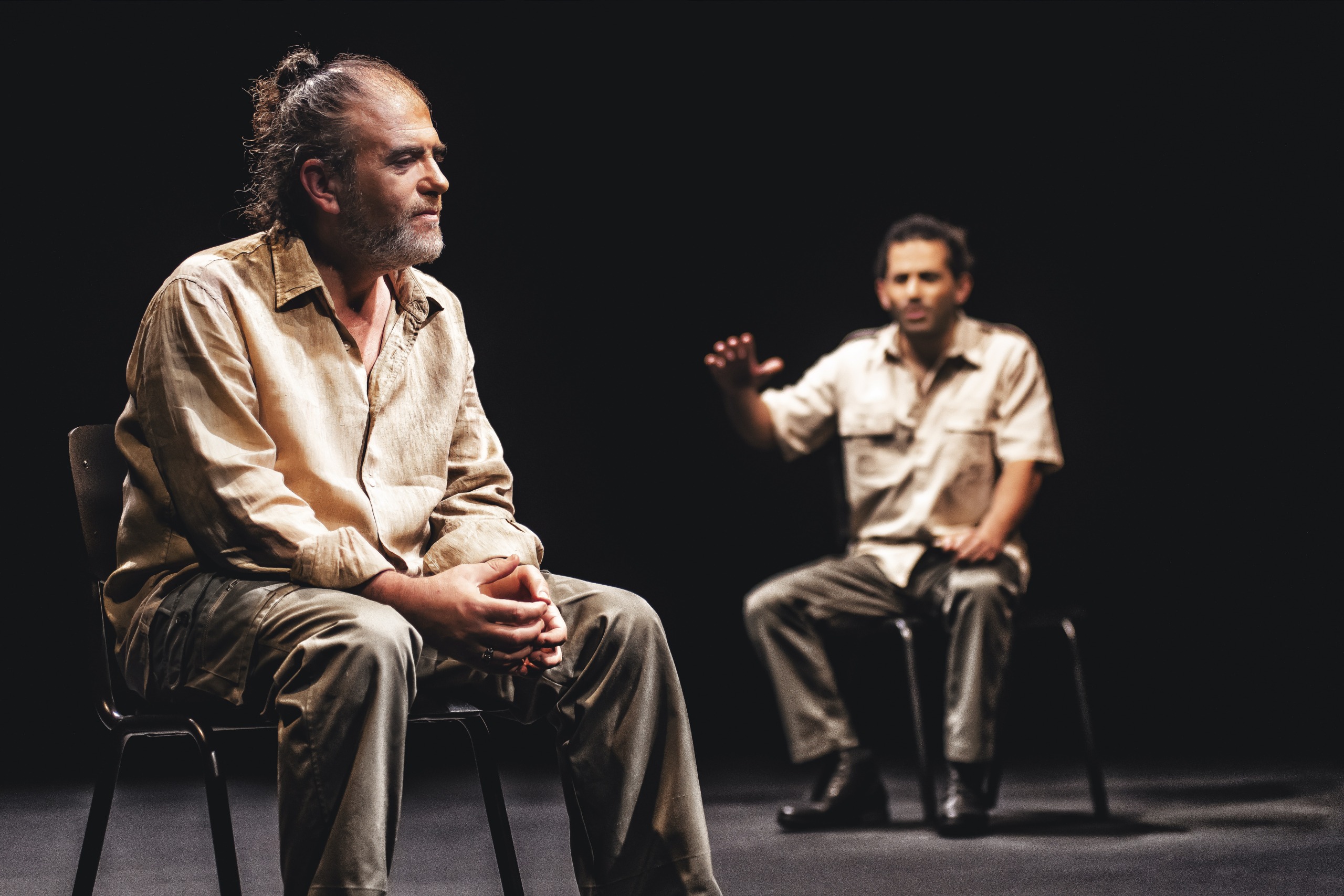Photo Debby Termonia
In Shahada – There is always a possible elsewhere, Fida Mohissen makes a confession. For this, he summons the Fida of the past, makes him tell his life in Syria, his dual relationship to theater and religion. Sleek to the extreme, the dialogue between the man of yesterday and that of today shows with great subtlety the construction of an artist. And the conquest of freedom.
With his slow but determined step, his gaze that goes straight to the public, while expressing a thought turned inwards, a form of meditation, Fida Mohissen immediately suggests the long path he had to travel to get there. To his only way of being present, fully, and then of breaking the silence with a very simple sentence – ” I came to talk to you –, the author and actor makes us feel all the difficulty of this speech. Shahada – There is always a possible elsewhere is by far the most intimate show of this Syrian artist who has lived in France for 24 years. And for a long time now in the City of the Popes where he co-directs 11 · Avignon. This is where he is performing his play this summer, for which he completely abandons his ethos as the director of the place. Fida Mohissen arrives at us stripped of the slightest social mask, because his approach imposes it: going back into the past to bring up a memory that is difficult to admit for the man of the theater he has become, that of a youth spent in the bosom of of the Baath party, then in power in Syria, and in a radical Islam which, in his words, made him live ” continually in fear, guilt, remorse, and oppressed his free will “.
In her perilous archaeology, insofar as she tends to bring together in the same space two usually opposed visions of the world – that of the artist and the religious – Fida Mohissen does not engage alone. He surrounds himself with people from various backgrounds and backgrounds, only one of whom appears on set: the actor Rami Rkab, in the role of the young Fida in dialogue with the Fida of today. The others are invisible, but nevertheless very present as companions of a complex geographical, mental and spiritual crossing. Assisted by Fida Mohissen’s longtime collaborator, Amandine du Rivau, director François Cervantes is a precious companion on the difficult road to Shahada, which means ” to be present, to witness, to attest ». Familiar with 11 · Avignon where he presented several of the creations of his company L’Entreprise, François Cervantes deviates from his habits here: he does not sign the text of the play, nor has he chosen the performer. . His participation in the adventure was rather imposed as the logical continuation of an artistic conversation maintained for several years with the author and actor, as a gesture of friendship.
However, we find in Shahada motifs that run through the theater of François Cervantes: the emergence of usually inaudible words, the tears between tradition and creation, or even the distance that separates the body from the verb. By summoning the young man he was, asking him to recount all that the adult man wanted to forget, Fida Mohissen achieves all of this. Motivated by a sense of responsibility towards his daughters and the young people of their generation », by the desire to warn them against the temptations of radicalization, the words he deploys have great theatrical force. We don’t just guess the role of François Cervantes in this one: Fida explains it from the outset, thus preventing any illusion of naturalness. By revealing the director’s presence behind his words, he shows the scaffolding that was not erected in a day. It also assumes its collective dimension, from its factory to its destination.
Thanks to a refined language, reduced to the essentials, and an equally economical narrative, Fida Mohissen makes her personal story a journey that everyone can join from the place they want: through theater or religion, through spirituality, the question of personality or freedom.. The latter connects all the other subjects addressed by the two Fida in their fragmentary discussion, made up of a series of memories of Syria and France. Although out of order, and separated by a silence that always brings us back to the situation of enunciation, these stories that have survived the oblivion where they have long remained draw together an itinerary which, from confinement, goes towards an emancipation. The love of the other, which is expressed in Shahada through the very gentle exchange between the two actors, as well as in the words that Fida uses to describe her relationship with François Cervantes, is the key to this conquest. She irrigates Shahada without ever making it fall on the side of sentimentality or seduction. This is one of the great successes of the play: the gift on which it is based is all the more touching in that it is delivered without affectation, by the sole tools of a theater reduced to its essence..
Anaïs Heluin – www.sceneweb.fr
Sahada – There is always a possible elsewhere
Text Fida Mohissen
Directed by François Cervantes
With Fida Mohissen and Rami Rkab
Assistant director Amandine du Rivau
Costumes and accessories Virginie Breger
Light design Christian Pinaud
Sound design Gabriel AcremantProduction Made in Belleville
Co-production Isharat, L’Entreprise – François Cervantès company, Théâtre de Poche – Brussels, Manège Maubeuge, National Stage, Montansier Theater – Versailles, Chateauvallon-Liberté, National Stage, Jean Lurçat Cultural and Artistic Center Association – Aubusson National Stage and Made in Belleville.
SPEDIDAM supportersDuration: 1h10
Avignon Festival Off 2023
11 Avignon
from July 7 to 26, at 12:15 p.m. (break on July 13 and 20)
“Shahada”, Fida Mohissen from one world to another – Sceneweb


